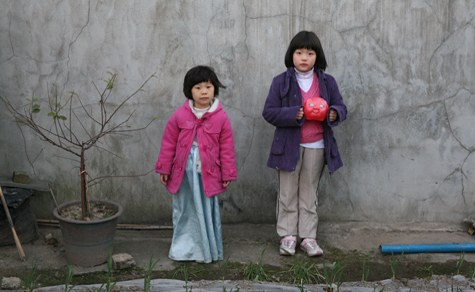
The striking thing about the movie to me was how with only very minimal dialogue, it succeeded nonetheless in being intensely psychological. The camera was almost invariably very close in to the girls' faces, and was an incredibly realistic portrait of childhood unhappiness and discomfort. The little girls, especially the older one, Jin, are not always sympathetic in their unhappiness. They whine and fight and cheat and do bad things. But it is all against such a stark background of dislocation and neglect that the viewer is drawn into the dramatic condition of childhood, where seemingly small things assume tremendous psychological significance. The little plastic piggy bank (pictured above), a central object in the story, teaches the girls that there is no magic in the world. And while the kindly halmuni (grandmother) in the end is, I think, supposed to be a ray of hope, Pocket of Bolts walked out of the movie saying it was about the most depressing thing he'd ever seen.
I walked out babbling my long-forgotten childhood Korean.
The dialogue of almost the entire movie was just at the level of the Korean I must once have known: language used by, with, and for little kids. They're words I couldn't spell to write them out in this blog, but they sprang fully formed into my comprehension and even production. Hey you, get over here. I'm hungry. Yum. It's okay. Thank you. Grandmother, grandfather. One two three four five. It's already been a week and I am forgetting again, but man, it was amazing. All that stuff's still in there somewhere, primary linguistic data. The film was sad, of course it was. But I felt weirdly exhilarated.
Also, the blue princess dress that the younger girl clings to throughout--I had a dress very much like that, at very much the same age. And I wore it about like the girl did. "What can't you PLAY like a princess too?" her aunt scolds her, while scrubbing at the dirt stains. But what good is it being a princess if you can't climb to the top of the dirt-pile, or scramble around in the field trapping grasshoppers to roast and eat? No doubt being an actual princess is no fun at all, but the idea of being a princess is to feel glamorous and special at every single moment, no matter what you are doing.
No comments:
Post a Comment